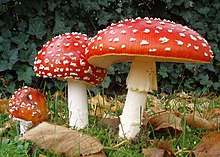Apotemnophilia and Amanita muscaria

Apotemnophilia is sexual arousal based on the image or fantasy of one’s self as an amputee. It can be associated with Body integrity identity disorder (BIID) in which otherwise sane and rational individuals express a strong and specific desire for the amputation of a healthy limb or limbs.
Body integrity identity disorder (BIID, also referred to as amputee identity disorder) is a psychological disorder wherein sufferers feel they would be happier living as an amputee. It is related to xenomelia, “the oppressive feeling that one or more limbs of one’s body do not belong to one’s self”.
Amanita muscaria, commonly known as the fly agaric or fly amanita, is a mushroom and psychoactive basidiomycete fungus, one of many in the genus Amanita. Amanita muscaria is noted for its hallucinogenic properties, with its main psychoactive constituent being the compound muscimol.
Perceptual phenomena such as macropsia and micropsia may occur. Macropsia (also known as megalopia) is a neurological condition affecting human visual perception, in which objects within an affected section of the visual field appear larger than normal, causing the person to feel smaller than they actually are. Macropsia, along with its opposite condition, micropsia, can be categorized under dysmetropsia. Macropsia is related to other conditions dealing with visual perception, such as aniseikonia and Alice in Wonderland Syndrome (AIWS, also known as Todd’s syndrome).
Agaricus muscarius should be considered in homeopathic therapy of such conditions like Apotemnophilia or Body integrity identity disorder.
See also: